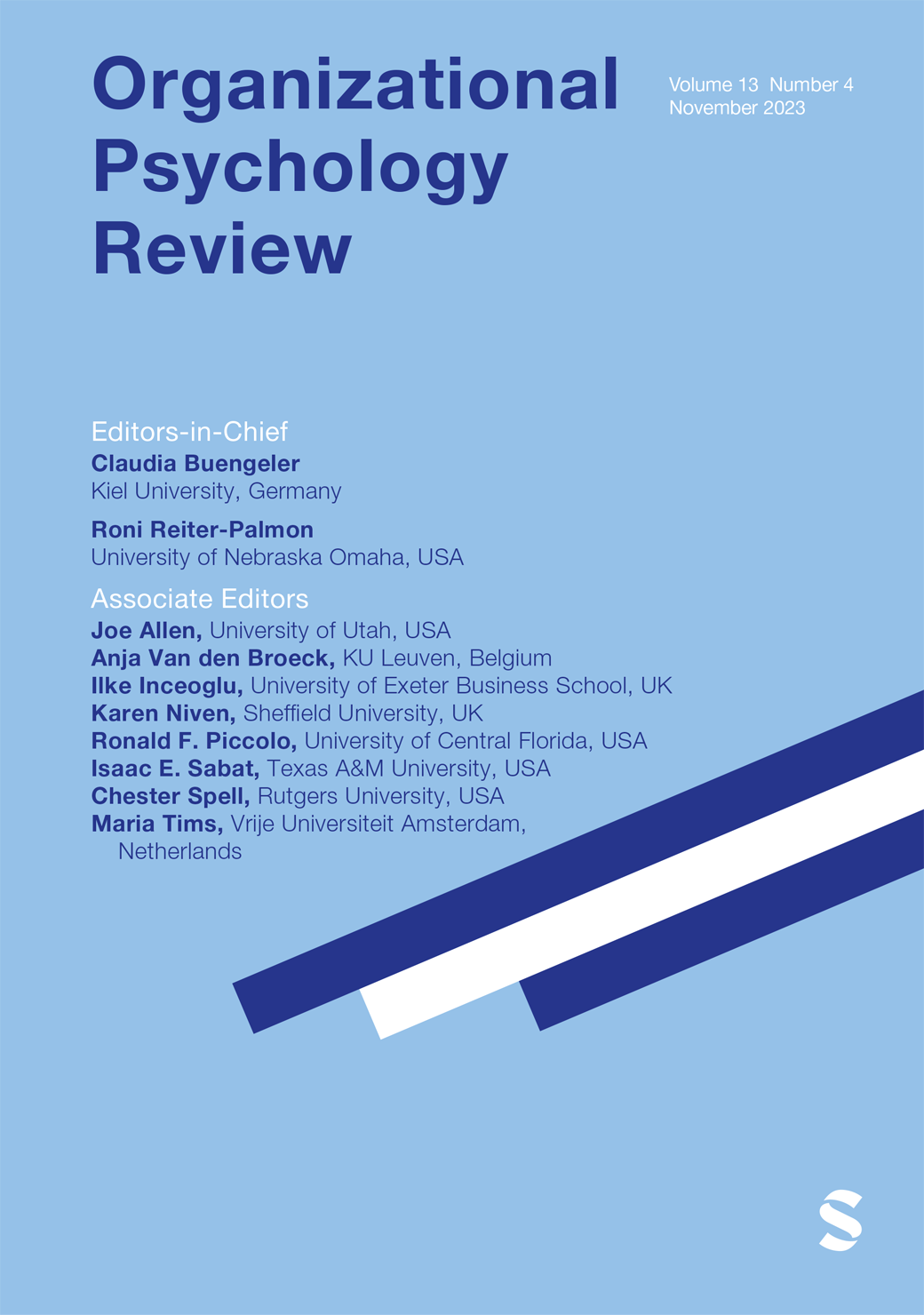盘点和前进:综合四十年工作不安全感研究的文本统计方法
IF 7.1
1区 心理学
Q2 MANAGEMENT
引用次数: 6
摘要
我们收集了1984年至2019年间发表的研究工作不安全感的手稿摘要,并进行了文本分析,以调查定义集群、它们随时间的发展,以及是否有证据表明存在孤立的知识。结果表明,工作不安全感的研究似乎分散在学科焦点上(组织心理学、公共卫生、经济学和社会学)。对组织心理学语料库的进一步分析显示,25个主题具有不同的时间轨迹:一些主题在增加(分析进展和认知和情感工作不安全感的区分),而另一些主题在减少(规模发展)。其余的摘要揭示了15个具有更稳定轨迹的主题。基于这些结果,我们确定了未来关于工作不安全感的组织研究的五个领域:不断变化的劳动力市场,更好地理解边缘化工人的经历和工作不安全感的非工作结果的需要,定性研究的附加价值,以及作为研究人员批判性地评估我们假设的需要。自Greenhalgh和Rosenblatt的论文发表以来,关于工作不安全感的研究迅速发展。从跨学科的角度来看,我们收集了1984年至2019年间发表的所有同行评审的研究工作不安全感的论文摘要,并使用潜在狄利克雷分配和Reinert方法进行了文本分析,以调查(a)工作不安全感研究的定义集群,(b)这些集群随时间的发展,以及(c)是否存在孤立知识的证据。研究结果表明,工作不安全感的研究似乎分为四个主要学科(组织心理学、公共卫生、经济学和社会学),相互影响相对较小。我们进一步分析了来自组织研究的工作不安全感摘要,揭示了25个具有不同时间轨迹的主题(例如,“热门”主题,包括越来越多地使用先进的分析技术,以及认知和情感工作不安全感的区分)和“冷”主题,包括工作不安全感措施的发展)。其余的摘要揭示了15个随着时间的推移具有更稳定研究兴趣的主题(例如,对评估理论的持续依赖)。基于这些结果,我们确定了未来工作不安全感组织研究的五个领域:不断变化的劳动力市场,需要更好地理解边缘化工人的经历和工作不安全感的非工作结果,定性研究的附加价值,最后需要批判性地评估我们作为研究人员的假设。本文章由计算机程序翻译,如有差异,请以英文原文为准。
Taking stock and moving forward: A textual statistics approach to synthesizing four decades of job insecurity research
We collected the abstracts of manuscripts examining job insecurity published between 1984 and 2019 and carried out a textual analysis to investigate the defining clusters, their development over time, and whether there was evidence of siloed knowledge. Results suggested that job insecurity research seems to be fragmented into disciplinary foci (organizational psychology, public health, economics, and sociology). Further analyses on the organizational psychology corpus, revealed 25 topics with distinct temporal trajectories: some were increasing (analytical advances and differentiation between cognitive and affective job insecurity) while other were decreasing (scale development). The remaining abstracts revealed 15 topics with more stable trajectories. Based on these results, we identified five areas for future organizational research on job insecurity: the changing labor market, the need to better understand the experiences of marginalized workers and non-work outcomes of job insecurity, the added-value of qualitative research, and the need to critically evaluate our assumptions as researchers.
Plain Language Summary
Since the paper by Greenhalgh and Rosenblatt, research on job insecurity has burgeoned. Taking an interdisciplinary perspective, we collected the abstracts of all peer-reviewed manuscripts examining job insecurity published between 1984 and 2019 and carried out a textual analysis using the Latent Dirichlet Allocation and the Reinert method to investigate (a) the defining clusters of job insecurity research, (b) the development of such clusters over time, and (c) whether there was any evidence of siloed knowledge. Results suggested that indeed job insecurity research seems to be fragmented into four main disciplinary foci (organizational psychology, public health, economics, and sociology) with relatively little cross-fertilization. We conducted further analyses of the abstracts stemming from organizational research on job insecurity, revealing 25 topics with distinct temporal trajectories (e.g., “hot” topics including the increasing use of advanced analytic techniques and differentiation between cognitive and affective job insecurity) and “cold” topics including the development of job insecurity measures). The remaining abstracts revealed 15 topics with more stable research interests over time (e.g., a continued reliance on appraisal theories). Based on these results, we identified five areas for future organizational research on job insecurity based on: the changing labor market, the need to better understand the experiences of marginalized workers and non-work outcomes of job insecurity, the added-value of qualitative research, and finally the need to critically evaluate our assumptions as researchers.
求助全文
通过发布文献求助,成功后即可免费获取论文全文。
去求助
来源期刊

Organizational Psychology Review
Multiple-
CiteScore
10.00
自引率
1.60%
发文量
25
期刊介绍:
Organizational Psychology Review is a quarterly, peer-reviewed scholarly journal published by SAGE in partnership with the European Association of Work and Organizational Psychology. Organizational Psychology Review’s unique aim is to publish original conceptual work and meta-analyses in the field of organizational psychology (broadly defined to include applied psychology, industrial psychology, occupational psychology, organizational behavior, personnel psychology, and work psychology).Articles accepted for publication in Organizational Psychology Review will have the potential to have a major impact on research and practice in organizational psychology. They will offer analyses worth citing, worth following up on in primary research, and worth considering as a basis for applied managerial practice. As such, these should be contributions that move beyond straight forward reviews of the existing literature by developing new theory and insights. At the same time, however, they should be well-grounded in the state of the art and the empirical knowledge base, providing a good mix of a firm empirical and theoretical basis and exciting new ideas.
 求助内容:
求助内容: 应助结果提醒方式:
应助结果提醒方式:


